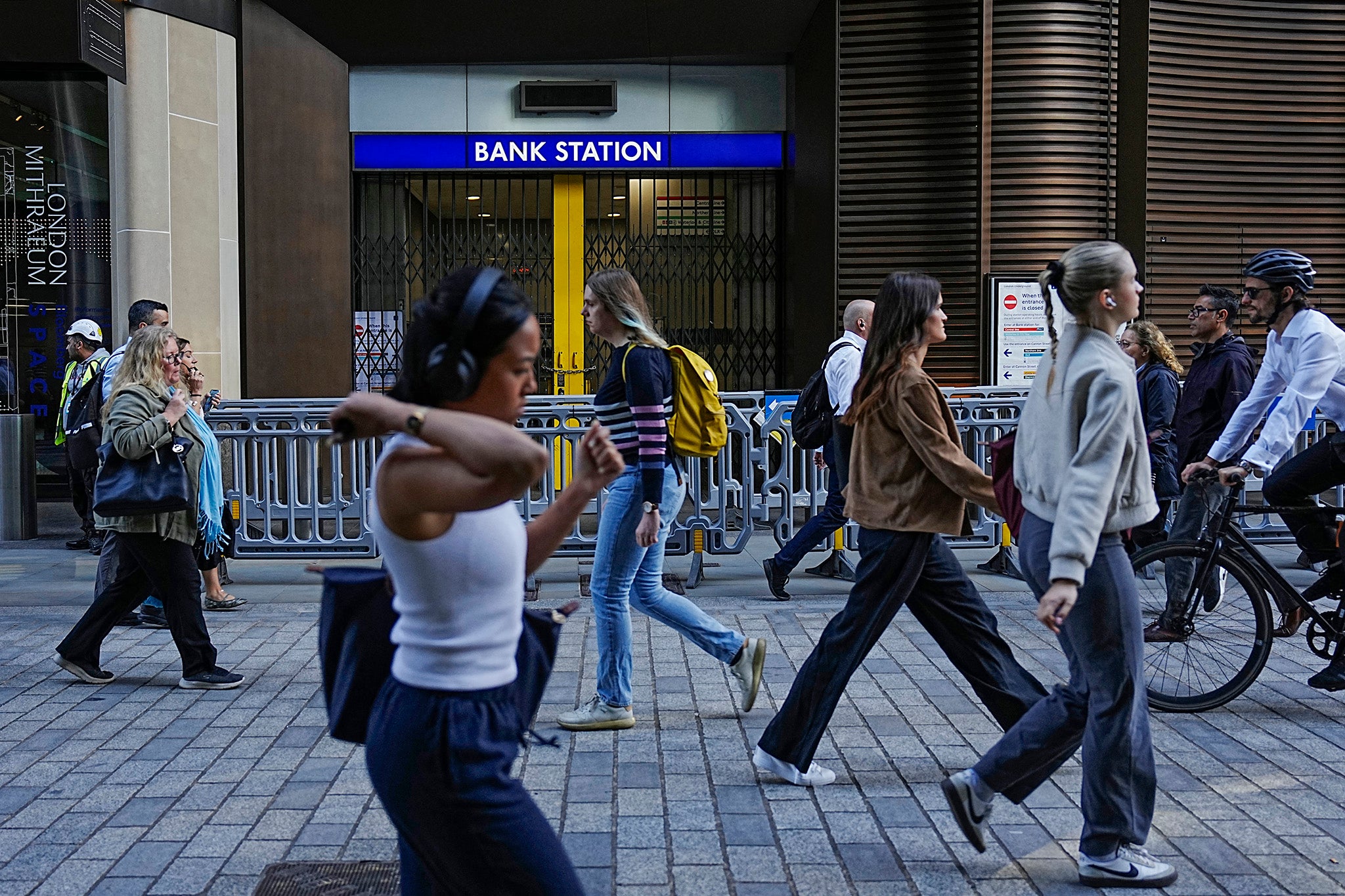Tube drivers in London earn more than resident doctors, The Independent can reveal, as strike action brings services to a halt in London in a dispute over pay.
Salaries for fully qualified Transport for London (TfL) drivers start at around £71,000 in the nation’s capital – matched only by their counterparts in Denmark – and they are paid more than drivers in Japan, France, and Germany.
London Underground (LU) services are suspended this week, as Tube drivers and other LU staff began a five-day strike on Sunday over pay and working conditions, causing travel misery for commuters.
The RMT (rail, maritime and transport) union has rejected a 3.4 per cent pay rise offer made by TfL and is asking for a 32-hour working week – or four days – down from 35 hours.
Nick Dent, London Underground’s director of customer operations, said union demands for a cut in the 35-hour week were “simply unaffordable” and would cost hundreds of millions of pounds.
Economists have also voiced concern that the union action could deliver a £230m blow to the capital’s economy, with small businesses hardest hit.

RMT warned that “fatigue and understaffing are a dangerous mix”, sharing in a post on X (Twitter): “The Tube is operating with 2,000 fewer staff than before the pandemic so our members are working more extreme shifts (4 am starts, 1 am finishes) to keep London moving.”
A Transport for London spokesperson has responded: “The RMT’s claim that fatigue is being driven by 2,000 fewer people on London Underground (LU) is completely untrue. It is a wilful misrepresentation to suggest that numbers have reduced by that level. The vast majority of those 2,000 have merely been restructured into TfL divisions - for example, TfL Engineering - rather than London Underground divisions.
“The actual reduction in LU roles is just over 200 compared to March 2019 and that is more than made up for by new roles elsewhere - for example, on the Elizabeth line. So, there are actually more, not fewer, staff working on TfL services than before the pandemic.”
Strikes are expected to continue on every London Underground line until Thursday 11 September. The DLR will also be disrupted by a strike on 9 and 11 September.
Underground lines affected are: Bakerloo, Central, Circle, District, Hammersmith & City, Jubilee, Metropolitan, Northern, Piccadilly, Victoria and Waterloo & City.
The Overground, Elizabeth line, buses, trams and National Rail services will continue to operate as usual, but as a result have been more overcrowded.
How much are Tube drivers paid by TfL?
According to the TfL, the average Tube driver has a starting salary of £71,160.
Station staff, who are also striking, start on £35,270 and within a few months can qualify for a salary of £44,140.
Tube drivers do not require prior qualifications other than GCSEs in Maths and English grades 9 to 4 (A* to C), or equivalent.
They must then undergo training, which can last from six months to two years, after completing a number of assessments, medical checks, and interviews to be accepted onto the scheme.
Tube drivers have some of the highest-paid starting salaries in the public sector.
Resident doctors, previously known as junior doctors, start on between £38,831 and £44,439, according to the latest NHS figures – nearly half (53 per cent) of the starting salary of a qualified Tube driver.
A doctor starting specialist training will earn between £52,656 and £73,992. This is on par with the starting salary for Tube drivers, despite doctors having to complete several more years of training.
Teachers in England and Wales can earn between £31,650 and £49,084, according to jobs site Prospects, while salaries can go up to around £60,000 for more senior teachers and headmasters in London.
In comparison, social workers earn between £32,000 and £48,000, while refuse collectors have a salary range of £24,000 and £30,000, as listed on the gov.uk national careers website.
In comparison, the starting salary for train drivers in the UK is much higher than that of their European counterparts, according to data collected by global research company Salary Expert.
A Metro driver in France is likely to earn an average of €50,409 (£43,674), whilst in Germany the average income of a U-Bahn driver is €71,217 (£61,563).
In the United States, the average pay for a subway driver is $79,541 (£58,589), whereas in Canada, it can average $88,364 (£47,191).
In Japan, which boasts one of the fastest and most efficient public transport systems in the world, a train driver in Tokyo could earn an average of around ¥9m (£45k).
London Tube drivers’ salaries are only matched by workers in Denmark (£71,927), where pay is generally higher than in the UK.
Claire Mann, TfL’s chief operating officer, said: “We are bitterly disappointed that the RMT has chosen to go ahead with this action despite our fair, affordable pay offer.”
“We have been clear that their demand for a reduction in the working week is unaffordable and impractical, and we urge them to put our offer to their members.
Conservative group to hold vigil in London after Trump ally shot dead
Trainline shares accelerate on rosier earnings outlook
More commuters cycling to work because of Tube strike, new figures suggest
Alpaca, donkey and bear enthusiasts battle over £1.9m will of llama-loving pensioner
Prince Harry meets King Charles for ‘private tea’ in first meeting in 19 months
Only half of people with cancer are diagnosed within NHS target time, analysis finds







